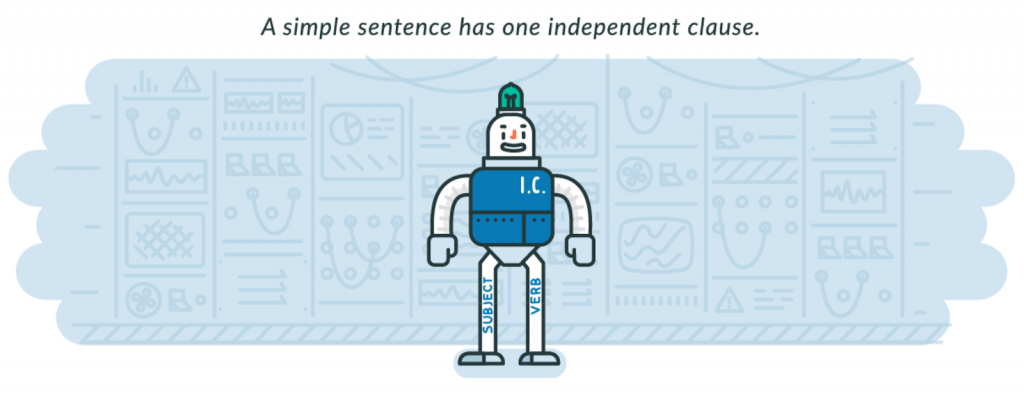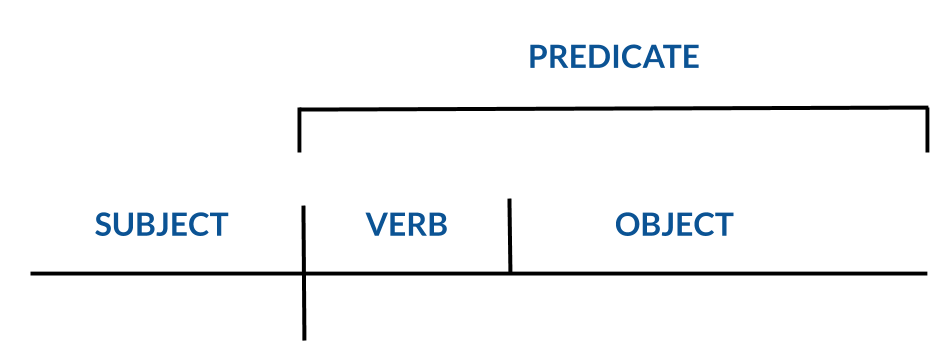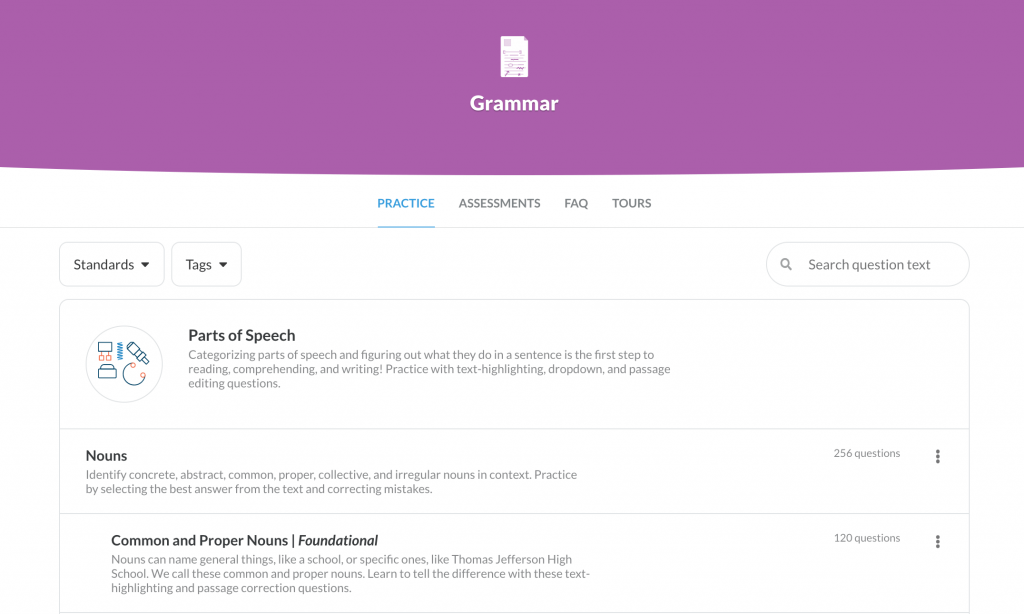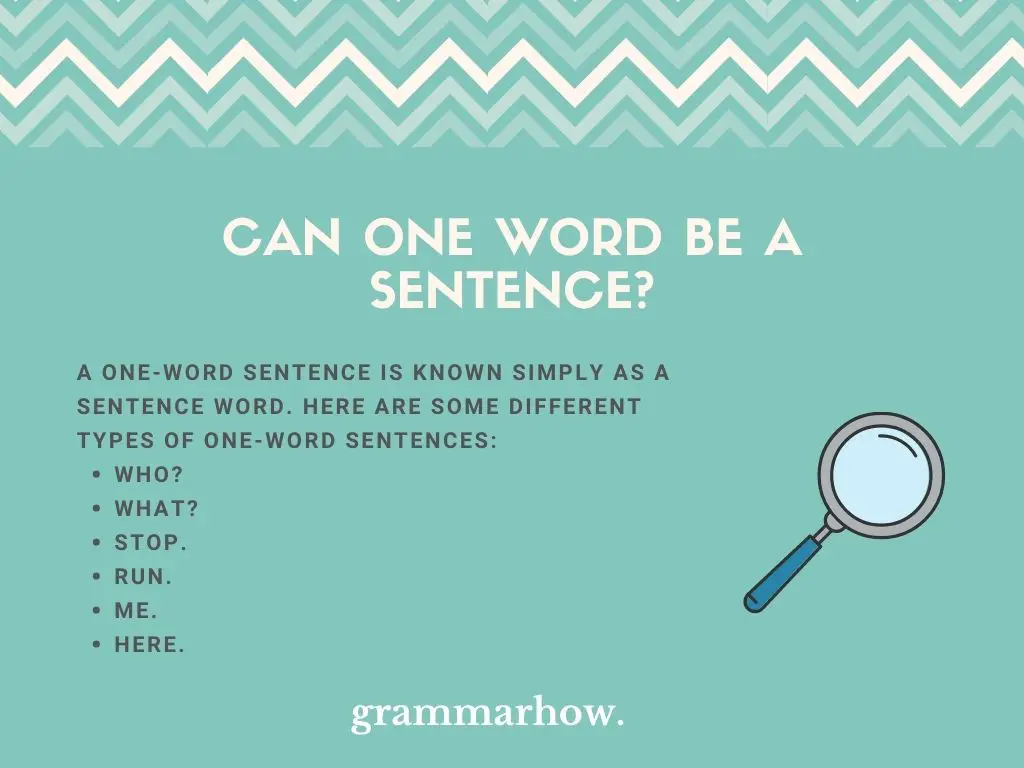It might sound a little outlandish, but you can form sentences with only one word. That’s right; you can write one word and then place a period (or exclamation mark) to close it. This article will explore some examples to help you understand them.
Can One Word Be A Sentence?
Of course, it’s possible to come across one word as a sentence. Here are some of the types that we will mention in this article:
- Interrogatives
- Imperatives
- Declaratives
- Locatives
- Nominatives
- Adjectives
- Adverbs
- Accusatives
- Exclamations
A one-word sentence is known simply as a sentence word. The above types are all the broader words we can use to describe specific types of sentence words. Each one offers a different way for us to use a one-word sentence when they apply.
Interrogatives
Interrogatives are the most common form of sentence words. We use them mainly as questions because they cover the most common words in English like “who,” “what,” and “where.” These words are all simple one-word sentences in the form of direct questions.
Here are some of the best interrogatives you can use:
- Who?
- What?
- Where?
- How?
- When?
- Why?
As you can see, each one is followed by a question mark. This shows that all interrogatives work best when we are directing them as a question toward someone.
It’s also common for the answer to be a sentence word, but it depends on the context. Most of the answers you can give to interrogative sentence words will apply to one of the other sections coming up in the article.
Imperatives
Imperatives are commanding words. We can use verbs to command someone to do something in the imperative case. It’s common for imperative sentences to have only one word because it shows the emphasis and need of someone to follow whatever command you are giving.
Since all imperatives are commands in the form of verbs, these examples should help you to understand them:
- Stop.
- Don’t.
- Leave.
- Go.
- Run.
- Walk.
- Work.
- Return.
Each of these verb forms allows us to give someone a command. The period after each one really emphasizes the need for someone to listen to what we have to say.
It can be easy for some people to ignore commands, which is why the imperative form exists. We can use these sentence words with a stern tone to show that we are only interested in someone listening to us (it’s usually for their own good).
Declaratives
Declaratives allow us to declare ourselves or someone else as an answer. We can use declaratives like “me” when we want to show that we are happy to declare ourselves or our actions in some way. Again, this mostly works when we are replying to specific questions.
There aren’t many good declaratives, but they’re still used. Here are some examples:
- Me.
- Aye.
It’s difficult to come up with many more legitimate declaratives. Some people might argue that “she” or “he” would work, but it’s not common for English speakers to use either of those pronouns as a sentence word.
That’s why “me” is the most appropriate declarative because it’s reasonable to expect someone to declare themselves as a candidate for something.
“Aye” also works because it’s a proclamation that we agree with something.
Locatives
Locatives are a more specific branch of sentence words we can use. They are word forms that always refer to locations. For example, we might say something like “here” or “there” when we are trying to show where something is happening. That’s how locatives work.
Locatives relate to locations, which these examples will make clear:
- Here.
- There.
- Everywhere.
- Nowhere.
- Home.
- Near.
- Far.
- Wherever.
- Somewhere.
As long as a position or place is mentioned in the sentence word, locatives work well. They work when replying to certain questions, so you might benefit from checking out the following examples:
- Where do you live?
- Here.
- Where were they last?
- There.
As you can see, we use them to reply to questions about someone or something’s location.
Nominatives
Nominatives are ways for us to nominate someone else. We can offer names, people, and things in the nominative case. It’s most common to see someone’s name as the nominative form when we are presenting a sentence word answer to a question.
Nominatives can cover anyone’s name, so we’ll include some examples to help you:
- Jane.
- John.
- Sarah.
- Stuart.
- Smith.
- Daniel.
- Craig.
- Lewis.
- Martin.
There are plenty of questions that could lead us to use a nominative form. For example, if someone asked us who completed a specific job, we could provide the name if we know the person that did it.
Technically, we can also provide names of items or objects rather than just people. It mostly refers to things that you can nominate or pick out as a culprit for something, which is why it works well in many different cases.
Adjectives
Adjectives are a common form in the English language. We use them as descriptive words, but it’s also common to see them as sentence words. However, it mostly only applies to informal situations when you want to use adjectives in this manner.
Here are a couple of examples to help you out:
- Pretty.
- Cute.
- Nice.
- Kind.
- Happy.
- Friendly.
- Incredible.
- Amazing.
- Brilliant.
- Gorgeous.
- Ugly.
- Grim.
While it’s easy to easy adjectives in the sentence word form, you might not be entirely sure how to use them correctly. Remember, it’s mostly an informal construct because you would be expected to use more words formally.
You might find it useful to also see a question and answer formation to see how this works:
- What do you think of this artwork?
- Gorgeous.
- How do you find her?
- Pretty.
As you can see, each of the adjective answers allows us to modify a specific noun listed in the question. For example, the first question asked about “artwork,” which we can modify with the responsive adjective “gorgeous.”
The second example used the noun “her,” and the descriptive word was “pretty.”
Adverbs
Adverbs are similar to adjectives. However, they usually include an “-ly” ending after the adjective and modify verbs. We can use adverbs to modify the verb that might have been presented in the previous question. If the question has no verb, an adverb cannot work.
These examples will help you make more sense of what adverbs can do:
- Calmly.
- Softly.
- Easily.
- Quickly.
- Gently.
- Nicely.
- Happily.
- Confidently.
- Rapidly.
- Cautiously.
- Barely.
You might also benefit from the following question and answer examples to help you figure it out:
- Would you take a look at this for me?
- Happily.
- How should I speak when giving the address?
- Confidently.
As you can see, we can only use adverb answers when someone has provided a verb for us to modify. In the first example, we are modifying the verb “look” with “happily” to show that we’re happy to take a look at what they’ve done.
The second example modifies the verb “speak” with “confidently” to show that we have a specific desire to listen to someone speak with a confident tone.
Accusatives
Accusatives are exactly what the name would suggest they are. We can use them to accuse someone specifically. The most common way for us to do this as a sentence word is by using object pronouns to point the finger toward someone you might have done something wrong.
If you don’t know what we mean, these examples will clear things up:
- Him.
- Her.
- Them.
- That.
- It.
- You.
- Me.
- Us.
Accusatives work well when someone has asked us for a culprit. If we know that someone has done something wrong (or even if we know that someone will be helpful to answer a question), we can use this form.
Here are some examples that should help you:
- Do you know who did it?
- Him.
- Who is the smartest person here?
- Her.
It doesn’t always have to refer to bad things. Sometimes, we can use the accusative form just to pick someone out from a crowd. It’s a quick way for us to respond to a question with a pronoun rather than an explanation.
Exclamations
Exclamations are another really common form of sentence words. A simple “yes” or “no” can apply when we are using exclamations. They are called exclamations because they allow someone to exclaim their answer to a question without more explanation.
Here are a couple of examples that will help you to figure it out:
- Yes.
- No.
- Maybe.
- Oh.
There are plenty of other exclamations in English, and some people will treat them more as interjections. For example, you might be familiar with ones like “huh” or “err.”
However, we didn’t want to include these ones because they’re not technically words that you can use in English. It’s always best to stick with ones that actually have definitions, which is why we thought it was reasonable to only include a handful.
Now you have all the necessary information to help you start using sentence words yourself. Exclamations tend to be one of the most common ways to do this without even thinking about it, so get to work!
Martin holds a Master’s degree in Finance and International Business. He has six years of experience in professional communication with clients, executives, and colleagues. Furthermore, he has teaching experience from Aarhus University. Martin has been featured as an expert in communication and teaching on Forbes and Shopify. Read more about Martin here.
Image by Ozzy Delaney on Flickr.com licensed under CC BY 2.0.
Here I’m going to highlight some of the simplest sentences in English. All of these sentences are only ONE word long! Sit back, relax, and enjoy; these are going to be some of the easiest English sentences you’ve ever learned. (It is about time something in English was easy, right?!)
One-word sentences in English come in a few different forms:
interrogatives or questions (example: Who?)
imperatives or commands (example: Stop!)
declaratives (example: Me.)
locatives (example: Here.)
nominatives (example: Jesse.)
In fact a lot of words in English can be one-word sentences, it all depends on the context.
A complete sentence, even a one-word sentence, needs to have a noun and a verb. In one-word sentences the subject (noun) or the action (verb) of the sentence is implied. That means it is understood in the context of the sentence (or the sentences around it) so that the subject and/or verb do not need to be stated explicitly.
Being brief and saying as much as you can in as few words as possible is something a lot of people want to do. Be careful though, sometimes you can sound robotic or rude if you use too many one-word sentences.
Here is a list of some common one-word sentences. I’m sure you already use some of these. Along side the one-word sentences I have written out what you could say, with more words, to mean the same thing.
Hi. (Hi there.)
Wait. (Please wait.)
Begin. (You may begin.)
Stop. (You need to stop.)
Hurry. (Hurry up please.)
Catch. (Catch this.)
Here. (Here you go.)
Go! (Get going now!)
Help! (I need help!)
Eat. (Go ahead and eat.)
Yes. (Yes, that would be great.)
No. (No, thank you.)
Thank you. (Thank you, I really appreciate it.)
The wh-question words: Who? What? Where? When? Why? How?
A lot of swear words: Sh*t., F*ck., etc.
Do you have a favorite one-word sentence? Add to this list by posting a comment below! Thank you.
English is a beautiful language, and one of its many perks is the one-word sentences. One-word sentences — as the name suggests is a sentence with a single word, and which makes total sense.
One word sentences can be used in different forms. It could be in form of a question such as “Why?” It could be in form of a command such as “Stop!” Furthermore, it could be used as a declarative such as “Me.” Also, a one-word sentence could be used to show location, for example, “here.” It could also be used as nominatives e.g. “David.”
Actually, most of the words in English can be turned into one-word sentences. All that matters is the context in which they are used. In a sentence, there is usually a noun, and a verb. In a one-word sentence, the subject and the action of the sentence is implied in the single word, and this is why to understand one-word sentences, one has to understand the context in which the word is being used.
Saying only a little at all times is a skill most people want to learn; knowing when to use one-word sentences can help tremendously. However, you cannot use one-word sentences all the time so as robotic or come off as rude.
 Here are common one-word sentences, and their meanings:
Here are common one-word sentences, and their meanings:
- Help: This signifies a call for help.
- Hurry: Used to ask someone to do something faster
- Begin: Used to signify the beginning of a planned event.
Basically, the 5 Wh-question words — where, when, why, who and what? can also stand as one-word sentences.
By Bizhan Romani
Dr. Bizhan Romani has a PhD in medical virology. When it comes to writing an article about science and research, he is one of our best writers. He is also an expert in blogging about writing styles, proofreading methods, and literature.

What does a conjunction do?Where is a conjunction used?What is a conjunction? Here we have answers to all these questions! Conjunctions, one of the English parts of speech, act as linkers to join different parts of a sentence. Without conjunctions, the expression of the complex ideas will seem odd as you will have to use…

Introduction An adverb is a word that modifies a sentence, verb, or adjective. An adverb can be a word or simply an expression that can even change prepositions, and clauses. An adverb usually ends only- but some are the same as their adjectives counterparts. Adverbs express the time, place, frequency, and level of certainty. The…

What is a noun?What are all types of nouns?How is a noun used in a sentence? A noun is referred to any word that names something. This could be a person, place, thing, or idea. Nouns play different roles in sentences. A noun could be a subject, direct object, indirect object, subject complement, object complement,…

What is a pronoun?How is a pronoun used in a sentence?What are all types of pronouns? A pronoun is classified as a transition word and a subcategory of a noun that functions in every capacity that a noun will function. They can function as both subjects and objects in a sentence. Let’s see the origin…

In the English language, sentence construction is quite imperative to understanding. A sentence can be a sequence, set or conglomerate of words that is complete in itself as it typically contains a subject, verb, object and predicate. However, this sentence regardless of its intent, would be chaotic if not constructed properly. Proper sentence construction helps…
Asked by: Cayla Wisoky
Score: 5/5
(37 votes)
From Wikipedia, the free encyclopedia. A sentence word (also called a one-word sentence) is a single word that forms a full sentence. Henry Sweet described sentence words as ‘an area under one’s control’ and gave words such as «Come!», «John!», «Alas!», «Yes.» and «No.» as examples of sentence words.
What is a one word line called?
Why? A lonely single word at the end of a paragraph creates a visual interruption in the flow that breaks the reader’s focus. This is called a “runt”.
Can a sentence contain 1 word?
A sentence must have a subject (noun) and a verb (action). However, when we speak we don’t always use complete sentences. So there are sentences that are made up of just one word followed by a punctuation mark. This is allowable because in one-word sentences either the noun or the verb is implied.
What is a short sentence called?
A simple sentence is built from the minimum of a subject and a main verb. It can be very short in length but doesn’t have to be. There are several reasons for using simple sentences.
What is a one word phrase?
In syntax and grammar, a phrase is a group of words which act together as a grammatical unit. … Phrases can consist of a single word or a complete sentence. In theoretical linguistics, phrases are often analyzed as units of syntactic structure such as a constituent.
41 related questions found
What are types of sentences?
The Four Types of Sentences
Declarative Sentences: Used to make statements or relay information. Imperative Sentences: Used to make a command or a direct instruction. Interrogative Sentences: Used to ask a question. Exclamatory Sentences: Used to express a strong emotion.
What are the 7 types of sentences?
The other way is based on a sentence’s structure (simple, compound, complex, and compound-complex).
- Statements/Declarative Sentences. These are the most common type of sentence. …
- Questions/Interrogative Sentences. …
- Exclamations/Exclamatory Sentences. …
- Commands/Imperative Sentences.
What is a two word sentence called?
Examples of two-word sentences that everyone would agree are «complete sentences» are «Dogs bark» (Subject Verb), «I slept» (Subject Verb), and «We left» (Subject Verb). If «sentence» means «utterance» or «turn at speaking,» the answer is also «yes».
What is the difference between Zeugma and Syllepsis?
is that syllepsis is (rhetoric) a figure of speech in which one word simultaneously modifies two or more other words such that the modification must be understood differently with respect to each modified word; often causing humorous incongruity while zeugma is (rhetoric) the act of using a word, particularly an …
Where is Ke in a sentence?
«I visited my old neighborhood where I have the best memories.» «I went back to the store where I bought my sweater.» «I went to the library where I studied until 8 o’clock.» «I went to my friend’s house where we got ready for the party.»
Is unfortunate a single word?
unfavorable or inauspicious: an unfortunate beginning. regrettable or deplorable: an unfortunate remark.
What is an example of enjambment?
Enjambment is the continuation of a sentence or clause across a line break. For example, the poet John Donne uses enjambment in his poem «The Good-Morrow» when he continues the opening sentence across the line break between the first and second lines: «I wonder, by my troth, what thou and I / Did, till we loved?
Is enjambment a technique?
Having a line break at the end of a phrase or complete thought is a regular and expected pattern in poetry. Poets subvert this expectation by using a technique called enjambment. Enjambment breaks with our expectations of where a line should end, creating a different feel to a poem.
Is enjambment a syntax?
In poetry, enjambment (/ɛnˈdʒæmbmənt/ or /ɪnˈdʒæmmənt/; from the French enjamber) is incomplete syntax at the end of a line; the meaning ‘runs over’ or ‘steps over’ from one poetic line to the next, without punctuation. Lines without enjambment are end-stopped.
Can there be a 2 word sentence?
Two-word sentences have all they need to qualify as complete sentences: a subject and a verb. Used appropriately, they can be powerful. When teaching students about complete sentences, the two-word sentence is a good starting point. «Chrysanthemum could scarcely believe her ears.
What is the longest sentence using only one word?
“Buffalo buffalo Buffalo buffalo buffalo buffalo Buffalo buffalo.” According to William Rappaport, a linguistics professor at the State University of New York at Buffalo (naturally), that — the word “Buffalo,” eight times in a row — is a legitimate, grammatically valid sentence.
Is yes a full sentence?
The single word yes could be considered a sentence because there is an understood subject and verb associated with it, one that could be drawn from…
What are the 12 types of sentences?
Types of Sentences
- 1 (1) Declarative Sentences.
- 2 (2) Imperative Sentences.
- 3 (3) Interrogative Sentences.
- 4 (4) Exclamatory Sentences.
What are the 8 kinds of sentences?
Terms in this set (8)
- Simple Sentence. a sentence with only one independent clause.
- Compound Sentence. a sentence made up of two or more simple sentences.
- Complex Sentence. …
- Compound-Complex Sentence. …
- Declarative Sentence. …
- Interrogative Sentence. …
- Imperative Sentence. …
- Exclamatory Sentence.
What are the 3 main types of sentences?
Three essential types of sentence are declarative sentences (which are statements), interrogative sentences (which are questions), and imperative sentences (which are orders).
Is When Pigs Fly an idiom?
«When pigs fly» is an adynaton, a way of saying that something will never happen. The phrase is often used for humorous effect, to scoff at over-ambition.
Is break a leg an idiom?
«Break a leg» is a typical English idiom used in the context of theatre or other performing arts to wish a performer «good luck». … When said at the onset of an audition, «break a leg» is used to wish success to the person being auditioned.
What is the idiom of spill the beans?
Disclose a secret or reveal something prematurely, as in You can count on little Carol to spill the beans about the surprise. In this colloquial expression, first recorded in 1919, spill means “divulge,” a usage dating from the 1500s.
Do you remember the first time you learned how to write a sentence? Most of us are taught how to put three words together to make sentences in kindergarten: I like dogs. She eats cookies. Games are fun! Sound familiar? These three-word sentences are one of the most basic types of simple sentences, and they serve as a foundation to forming more complex sentences. However, simple sentences are not always as simple as three-word sentences.
In this post we’ll review what simple sentences are, the parts of a simple sentence, and different ways to create simple sentences.
Once you’re feeling confident, test yourself with a post-assessment quiz and practice with our high quality, standards-aligned questions here.
The Basics of Simple Sentences

What are Simple Sentences?
A simple sentence is a sentence containing only one clause, or more specifically, an independent clause, with a subject and a predicate.
A simple sentence is typically made up of a subject, verb, and object, or SVO, and creates a complete thought; however, since a simple predicate is a verb or verb phrase only, a simple sentence can also be made up of only a subject and verb (SV).

Subject + Verb + Object (SVO)
- Jessie ate dinner.
Subject + Verb (SV)
- Jessie ate.
Both of these examples are grammatically correct simple sentences, but including an object helps to clarify the full idea of the sentence.
Despite their name, simple sentences can include things that are not so simple. Let’s review the use of modifiers, compound subjects, and compound verbs/predicates in simple sentences.
Modifiers in Simple Sentences

Modifiers are words or phrases that can be included in simple sentences to add more detail. Let’s see how we can modify the simple sentence used above:
- Jessie ate dinner.
Adding Articles/Adjectives
- The hungry Jessie ate a large dinner.
Adding Adverbs
- The hungry Jessie quickly ate a very large dinner.
Adding a Prepositional Phrase
- The hungry Jessie quickly ate a very large dinner after a long day at work.
All of these examples still qualify as simple sentences, because they are all independent clauses that convey a complete thought.
Pro Tip: Ask yourself how the sentence is changed as a result of a modifier.
Compound Subjects in Simple Sentences
Compound subjects are two or more nouns or pronouns sharing the same verb. They are joined using coordinate or correlative conjunctions.
Compound Subjects Using Coordinate Conjunctions
- Jessie and Jade ate dinner.
- Jessie or Jade ate dinner.
- Jessie, Jade, and Titus ate dinner.
Compound Subjects Using Correlative Conjunctions
- Both Jessie and Jade ate dinner.
- Neither Jessie nor Jade ate dinner.
Even with two or more simple subjects, these examples are independent clauses conveying a complete thought, so they are still simple sentences.
Compound Verbs/Predicates in Simple Sentences

Compound verbs, or compound predicates, are two or more verbs/predicates that share the same subject. This may be written as simply as a subject performing multiple verbs (simple predicates) or, more elaborately, as a subject performing multiple complete predicates. The compound verbs/predicates are joined by a conjunction.
Compound Verbs/Simple Predicates
- Jessie cooked and ate dinner.
- Jessie rinsed and washed the dishes.
Compound Predicates
- Jessie ate dinner and washed the dishes.
- Jessie cooked dinner and rinsed the dishes
Again, these examples are all independent clauses conveying a complete thought. So even with multiple verbs, a sentence can be a simple sentence.
Return to the Table of Contents
Tips for Using and Identifying Simple Sentences
Tip #1: Subject + Verb + Object (SVO) Simple Sentences Can be Arranged in Different Ways.
While a simple sentence is typically expected to contain a subject, verb, and object, this does not always mean that the subject will be the first thing we see in a sentence. When we place parts of the predicate at the beginning of the sentence or ask a question, the standard SVO arrangement of a simple sentence will vary.
Placing a Part of the Predicate Before the Subject
When the predicate, or verb + object portion of the sentence contains a prepositional phrase or adverb, they can appear at the beginning of the sentence followed by a comma. Check out the following examples to see sentences in both their standard forms and rearranged forms:
Prepositional Phrase:
- We completed our homework after school.
- After school, we completed our homework.
Adverb:
- I ran quickly to the store.
- Quickly, I ran to the store.
Asking a Question
Sentences that ask a question are called interrogative sentences, and they are often simple sentences. Some questions start with the main verb or part of the verb phrase. Look at the examples below to see the placement of the verb in both a question and the statement form of the question:
- Will it rain tomorrow?
- It will rain tomorrow.
- Has the race been postponed?
- The race has been postponed.
- Were you sick today?
- You were sick today.
Tip #2: Avoid using too many basic simple sentences in your writing.
Remember, basic simple sentences are the first type of sentence we learn how to write. So it’s probably safe to assume that filling our writing with three or four word sentences is not the best idea. Too many simple sentences close together can sound choppy and disconnected. Always revise your work to see where simple sentences can be edited to create more sophisticated writing.
Combine Simple Sentences
If you have a string of very basic simple sentences in your writing, you can probably combine some of those sentences into compound sentences.
Choppy:
- He loves baseball. He first played little league baseball. He joined the baseball team in middle school.
Revised:
- He loves baseball and played little league before joining the baseball team in middle school.
Tip #3: Add more detail.
There’s nothing wrong with using simple sentences in your writing, but you can (and should) use modifiers to enhance simple sentences when possible.
Basic Simple Sentence:
- I visited Chichén Itzá.
Revised:
- On my vacation to Mexico, I visited the ancient Mayan ruins of Chichén Itzá.
Return to the Table of Contents
Applying the Basics: Simple Sentences Review & Practice
Now that you understand what simple sentences are, and how to use them properly in your writing, let’s practice identifying them. Remember, a simple sentence is a sentence that contains one independent clause, or one complete thought.
Simple Sentences Exercises & Review
Complete the quick exercise below to assess your mastery of simple sentences.
Determine if the sentence is a simple sentence or not.
1. I finally received my passport for our trip overseas.
- Simple Sentence
2. Last week, she told the funniest joke in the middle of the meeting.
- Simple Sentence
3. Tim went to the store, and he bought a new laptop for school.
- Not a Simple Sentence
4. Julie and Paige went to the amusement park and rode a rollercoaster.
- Simple Sentence
5. I was exhausted after working all day.
- Not a Simple Sentence
For additional practice, check out the Simple Sentences content on Albert.
Return to the Table of Contents
Try for Yourself: Simple Sentences Quiz

Feeling confident in your understanding of Simple Sentences?
Take this short quiz to see what you’ve learned:
1. Can a simple sentence have more than one subject?
- Answer: Yes
- Correct Explanation: That’s right! A simple sentence can have more than one subject, or a compound subject, if they are sharing the same verb. The subjects are joined using coordinate or correlative conjunctions.
- Incorrect Explanation: Sorry, that’s not right. A simple sentence can have more than one subject, or a compound subject, if they are sharing the same verb. The subjects are joined using coordinate or correlative conjunctions.
2. Can a simple sentence be a single dependent clause?
- Answer: No
- Correct Explanation: That’s right! A simple sentence must be a single independent clause in order to be a simple sentence. It is a complete thought and can stand alone. A dependent clause cannot stand alone as a complete thought.
- Incorrect Explanation: Sorry, that’s not right. A dependent clause cannot stand alone as a complete thought. A simple sentence must be a single independent clause in order to be a simple sentence. It is a complete thought and can stand alone.
3. Can a simple sentence have more than one verb?
- Answer: Yes
- Correct Explanation: That’s right! A simple sentence can have more than one verb (compound verb/simple predicate) or more than one complete predicate (compound predicate) if they share the same subject. They are combined using a conjunction.
- Incorrect Explanation: Sorry, that’s not right. A simple sentence can have more than one verb (compound verb/simple predicate) or more than one complete predicate (compound predicate) if they share the same subject. They are combined using a conjunction.
4. Does a simple sentence always start with the subject?
- Answer: No
- Correct Explanation: That’s right! A simple sentence can start with part of the predicate. This might be a prepositional phrase, and adverb, or a question.
- Incorrect Explanation: Sorry, that’s not right. A simple sentence can start with part of the predicate. This might be a prepositional phrase, and adverb, or a question.
5. Is the following example a simple sentence?
After eating breakfast, Hayley went to dance practice, and she prepared for her performance.
- Answer: No
- Correct Explanation: That’s right! A simple sentence can have more than one predicate when that predicate shares the same subject. In this sentence, there are two independent clauses: After eating breakfast, Hayley went to dance practice. She prepared for her performance.
- Incorrect Explanation: Sorry, that’s not right. A simple sentence can have more than one predicate when that predicate shares the same subject. In this sentence, there are two independent clauses: After eating breakfast, Hayley went to dance practice. She prepared for her performance.
6. Is the following example a simple sentence?
Jim and Amy thoroughly cleared out the basement and hired contractors for a remodel.
- Answer: Yes
- Correct Explanation: That’s right! A simple sentence can have compound subjects and compound predicates as long as they form one complete thought. The subjects share the predicates, and the predicates share the subjects. In this case, the compound subject “Jim and Amy” share the compound predicates “thoroughly cleared out the basement” and “hired contractors for a remodel.”
- Incorrect Explanation: Sorry, that’s not right. A simple sentence can have compound subjects and compound predicates as long as they form one complete thought. The subjects share the predicates, and the predicates share the subjects. In this case, the compound subject “Jim and Amy” share the compound predicates “thoroughly cleared out the basement” and “hired contractors for a remodel.”
For additional practice with simple sentences, check out our completely free practice on Albert.io: Simple Sentences.
Return to the Table of Contents
Teacher’s Corner for Simple Sentences
While it’s true that simple sentences are a foundational grammar skill, the Common Core English Language Progressive Skills Chart shows that even elementary-level skills “require continued attention in higher grades as they are applied to increasingly sophisticated writing and speaking.”
For specific standards addressing simple sentences, check out the Common Core State Standards site!
Albert’s grammar course is 100% free, and the Simple Sentences practices can be used for much more than homework!
Our assessments can be used as pre-and post-tests to measure student progress. Our pre-made quizzes can be used as bell-ringers, exit tickets, and more!
In addition to our pre-made assessments, you can also use our assignments feature to create your own quizzes and assessments.
Summary on Simple Sentences
Simple sentences are sentences containing one independent clause, with a subject and a predicate.
Modifiers, compound subjects, and compound verbs/predicates can be used in simple sentences.
The standard arrangement of a simple sentence is subject + verb + object, or SVO order. This can vary by arranging parts of the predicate before the subject.
Practice makes perfect! Use our Simple Sentences practice on Albert’s completely free grammar course!
Need help preparing for your Grammar exam?

Albert has hundreds of grammar practice questions with detailed explanations to help you master concepts.





